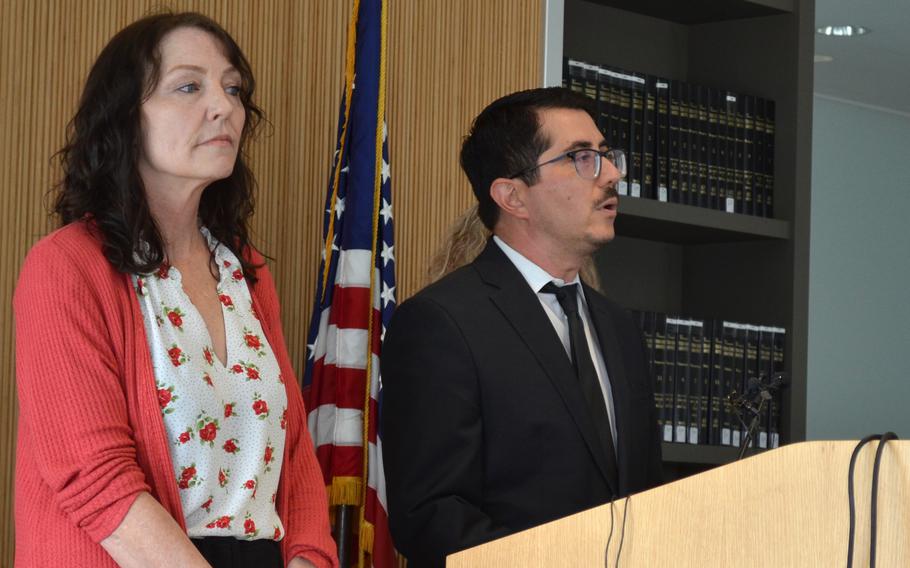
Travis County district attorney José Garza speaks at a news conference on June 4, 2024, with Sheila Foster, mother of Air Force veteran Garrett Foster, who was fatally shot by Army Sgt. Daniel Perry in 2020. (Rose L. Thayer/Stars and Stripes)
AUSTIN, Texas — A Texas prosecutor on Tuesday filed a request for the state’s highest criminal court to overturn Gov. Greg Abbott’s pardon of a former Army sergeant who was convicted of fatally shooting an Air Force veteran during a racial injustice protest in 2020.
The pardon given to Daniel Perry “made a mockery of our legal system,” said José Garza, the district attorney of Travis County, where Perry stood trial last year.
“It is up to our judicial system to determine whether a person is guilty or innocent and what the outcome should be, and then there is a lengthy appellate process that should be followed in every case. Here, the governor interceded [and] intervened in that process and prohibited the judiciary from doing their work,” Garza said during a news conference to announce his filing to the Texas Court of Criminal Appeals.
Garza stood alongside the family of Air Force veteran Garrett Foster, who Perry shot dead July 25, 2020. Foster, 28, was carrying an assault rifle in downtown Austin during a Black Lives Matter protest, when Perry, who was working a side job as a rideshare driver, turned his car into a group of protesters. Perry, who was also armed, said he shot Foster because Foster pointed his rifle at Perry’s car.
Perry, 37, was convicted of murder on April 7, 2023, and sentenced to 25 years in prison. Abbott issued the pardon May 16 after the Texas Board of Pardons and Paroles issued the unanimous recommendation.
Former Army Sgt. Daniel Perry in an undated booking photo. (Austin Police Department)
Abbott requested the board review Perry’s case just 18 hours after his conviction, said Sheila Foster, Garrett Foster’s mother.
“My own child was killed on American soil for doing nothing but practicing his First and Second Amendment rights, and our governor just said that’s OK. That that’s acceptable as long as he doesn’t like the victim or what the victim is saying,” she said during the news conference. “We had justice for Garrett for 18 hours after waiting three years for a trial.”
By issuing the pardon, Abbott exceeded his constitutional authority and violated the separation of powers doctrine, said Holly Taylor, director of the district attorney’s division of public integrity and complex crimes. The pardon also did not follow the process or meet the standards to support a finding of innocence, she said.
Doug O’Connell, Perry’s attorney, described the court filing as “more political theater.”
“The pardon power of the executive branch is a well-settled constitutional authority,” he said.
Perry, who enlisted in 2012, was stationed at Fort Cavazos, about 70 miles north of Austin, at the time of the shooting. Afterward, he was moved to Fort Wainwright in Alaska.
Garza said he has not reached out to the Army for possible charges in a military court-martial because he wants to follow the path of the Texas legal system.
Given the Army dismissed Perry with an other-than-honorable discharge in March, a court-martial is likely no longer an option, according to Nathan Freeburg, a former Army attorney who now specializes in military defense cases.
“By giving [Perry] an other-than-honorable discharge, they ended his service and the Army lost jurisdiction,” he said.
Freeburg referenced the case of Steven Dale Green and four other soldiers who shot and killed an Iraqi family in their home in March 2006. The other soldiers were still in the Army when the service began prosecution, but Green had already been discharged. He was instead tried and convicted in federal court under a law that allows the federal government to charge an American in civilian court for crimes committed overseas.
For Perry’s case, the federal system would have to find something akin to a civil rights violation.
“They could conceivably try him in federal court still. Double jeopardy doesn’t apply, as the Texas and federal courts are separate sovereigns,” Freeburg said. “It’s very rare, but it’s theoretically possible.”
Last month, attorneys general from 14 states called on the Justice Department to open a civil rights investigation.
“The Department of Justice plays an important role in ensuring that those who violate the civil rights of their fellow Americans are held to account, and that is especially the case when state or local jurisdictions refuse to do so,” the group wrote.
During Perry’s sentencing, prosecutors presented evidence from Perry’s phone records that included racist comments that the soldier made privately and publicly on social media. The records also showed his disdain for racial justice protesters.